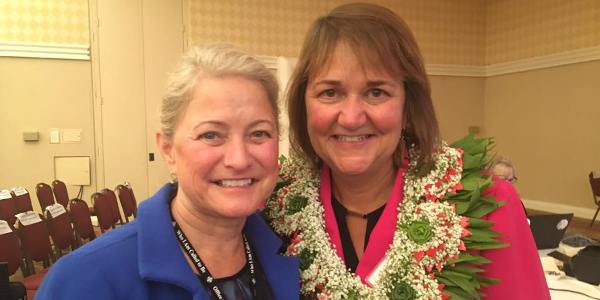
Last night, the Western Jurisdiction of the United Methodist Church elected our first openly-queer bishop, Karen Oliveto. In her speech after her election, she talked about “moving onto perfection,” making a reference to United Methodism’s most important doctrine, Christian perfection, which we understand to be the goal of all holiness. I’m convinced that Bishop Oliveto’s election is part of how God is restoring Wesleyan holiness to the United Methodist Church.
There are two primary places where the word “perfect” is used in the New Testament. In the Sermon on the Mount, when Jesus exhorts us to love our enemies, he says, “Be perfect as your Father in heaven is perfect” (Matthew 5:48). Then 1 John 4:18 makes this astonishing statement: “There is no fear in love, but perfect love casts out fear; for fear has to do with punishment, and whoever fears has not reached perfection in love.” Methodist founder John Wesley’s doctrine of Christian perfection is based on these two verses, which should be at the core of any Wesleyan Christian’s discernment about the implications of Bishop Oliveto’s election. Are we loving our enemies? Is our thinking shaped by fear or love?
For Wesleyan holiness, the goal of Christianity is to have a heart that “reaches perfection in love,” that is perfect love for God and neighbor, the fulfillment of the great commandment which Jesus calls the summation of all the law and prophets (Matthew 22:37-40). Holiness is entirely a question of our heart’s transformation. Any definition of holiness that does not have to do with the increase of love in our hearts is not Wesleyan. The way that Wesleyans pursue Christian perfection is through the means of grace, which can be divided into works of piety, like prayer and reading scripture, that concern our love of God, and works of mercy, like service work and fighting for justice, that concern our love of neighbor.
The model we are given in scripture for Christian perfection is the story of the Good Samaritan, a man with a completely despised identity whose heart was moved with compassion by the suffering of a wounded traveler. This story is the answer that Jesus gives when he’s asked what we must do to fulfill the law and inherit eternal life (Luke 10:25-37). Now we shouldn’t be glib about the challenge of perfecting our hearts in love. As long as my heart is cluttered with worldly idols, it cannot be perfected in love. The Bible teaches that idolatry is the foundation for injustice. If I am preoccupied with drugs, sex, money, success, or another idol, I will be too distracted to notice the wounded travelers God has called me to heal on my life journey. Only a heart that is emptied and surrendered to God will be moved the way the Samaritan was moved with compassion.
The enormous challenge of overcoming idolatry is the reason John Wesley taught us to be methodical in our Methodism. It’s the reason that he started the concept of covenantal discipleship small groups where Methodists could “spur one another on to love and good deeds” (Hebrews 10:24). For the most part, we’ve followed through with Wesley’s methods over the past several centuries, but too often, our sense of holiness has been detached from the goal of perfection in love. When our holiness is measured by something other than love, we’ve lost everything. If you can be “sinless” without being perfectly loving, then your definition of sin is no longer Wesleyan, or even Christian for that matter.
In the last forty-four years of debate over the inclusion of queer people in United Methodism, the moral framework established by our doctrine of Christian perfection has rarely been a part of the conversation. “Holiness” has been redefined as a code word for heterosexual normativity. Acceptance of queer people has been conflated with compromising the Christian gospel under the pressure of worldly secularism. Taking a stand against queer people has been conflated with choosing the kingdom of God over “friendship with the world” (James 4:4) by Christians who are friendly with the world’s presumptions about wealth, violence, selfishness, and a lot of other things.
This is because of the confusing legacy of the sexual revolution of the 1960’s. It’s certainly the case that our capitalist society has turned sex into a consumer good and sabotaged its ability to establish the sacred covenantal intimacy which God intended for it. The apostle Paul warns us against living “according to the flesh,” the life of mindless, addictive consumption that is ruining so many people in our society today. A hedonistic, promiscuous sexuality can certainly undermine our ability to be authentic vessels of God’s love. But the question for Wesleyan holiness is whether queer sexuality itself inherently sabotages Christian perfection. Is queerness an idol that undermines queer Christians’ ability to grow in their love of God and neighbor? Or is heteronormativity an idol that undermines anti-queer Christians’ ability to grow in their love of God and neighbor?
I certainly have a biased perspective on these questions as someone who was saved from toxic Christianity by a queer United Methodist church. For me to change my perspective, I would need to see how queerness inherently undermines love. That is the burden of proof established by Wesleyan holiness. Everything I have heard up to this point involves conflating queerness with worldliness, lawlessness, hedonism, or something else. And all I’ve encountered in my relationships with queer Christians is a deeper love for God and neighbor than I have. Wesleyan holiness is not about ideological conformity or moral legalism. It is about spiritual fruit, or it’s no longer Wesleyan.
A difficult road of discernment lies ahead for United Methodism as a denomination. For too long, decisions about opposing queer inclusion have been made in abstraction in the interests of “objectivity.” Those opposed to queer inclusion have not allowed themselves to face the witness of real queer Christians who are gifted and called by God to ordained ministry. Back in 1972 when the United Methodist Church adopted its anti-queer stance, queer identity was a dirty, secretive thing often involving the violation of marital covenants by queer people who had to marry straight. Forty-four years later, queer people no longer have to marry straight and spend their lives fighting an impossible battle. A Christian genuinely committed to Wesleyan holiness would ask whether love of God and neighbor is more perfected for queer people today or in 1972.
There is so much more to Bishop Karen Oliveto than the fact that she’s married to a woman named Robin Ridemour. My facebook feed is filled with stories from her former seminary students and colleagues attesting to how she completely changed their lives. Her spiritually thriving church Glide feeds and houses the homeless of San Francisco 365 days a year. I hope and pray that sincere conservative United Methodists will allow themselves to face the testimony of Oliveto’s life and ministry rather than insulate themselves from the Holy Spirit in bureaucratic, institutional procedures. If our goal as United Methodists is Christian perfection, then whatever we do must be framed in terms of seeking perfection in love. If perfection in love is no longer the goal, then we should no longer call ourselves United Methodists.












